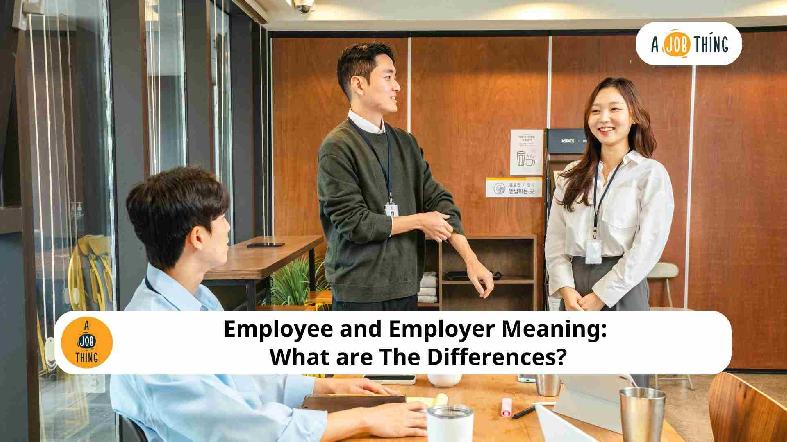
Employee and Employer Meaning: What are The Differences?
Are You Hiring?
Find candidates in 72 Hours with 5+ million talents in Maukerja Malaysia & Ricebowl using Job Ads.
Hire NowWhen managing a workplace, knowing the clear difference between employee and employer is crucial. Both roles depend on each other. One provides work and skills, while the other offers guidance, pay, and resources.
As an employer and worker in a company, you need to know that having a good understanding of what employee and employer mean can help to follow labour laws, maintain fairness, and create a healthy working environment.
What is an Employee?
Under Malaysia’s Employment Act 1955, an employee is a person hired by a company to perform tasks or services in exchange for wages or salary. Employees can work under different arrangements:
-
Full-time: Fixed monthly salary and benefits.
-
Part-time: Fewer hours, often paid hourly or daily.
-
Contract: Hired for a set duration or project.
-
Probationary: On trial before confirmation as a permanent staff.
Employees in Malaysia are entitled to rights such as timely salary payment, annual leave, sick leave, public holidays, and contributions to SOCSO, EPF, and EIS. They must also follow company rules and perform the duties assigned in their contract.
What is an Employer?
An employer is a person or organisation that hires individuals to work for them. Employers can be businesses, government agencies, or even individuals.
Employers have legal responsibilities such as preparing employment contracts, paying wages on time, and registering employees for statutory contributions (EPF, SOCSO, EIS). They must also provide a safe workplace, treat employees fairly, and follow labour laws when hiring or terminating staff.
Employee vs. Employer: Key Differences
|
Aspect |
Employee |
Employer |
|
Role |
Performs tasks assigned by the employer |
Owns or manages the business and oversees operations |
|
Authority |
Follows company policies and instructions |
Sets policies and makes decisions for the organisation |
|
Income Flow |
Receives wages or salary for work performed |
Pays wages and benefits to employees |
|
Accountability |
Responsible for completing assigned tasks |
Responsible for overall company performance and workforce welfare |
|
Dependency |
Depends on employer for income and resources |
Depends on employees to achieve company goals |
Types of Employment Relationships
In Malaysia, workplaces may include different types of employment arrangements:
-
Full-Time Employment: Long-term roles with fixed salaries and full benefits.
-
Part-Time Employment: Flexible hours, commonly in retail or F&B sectors.
-
Contract Employment: Hired for specific projects or fixed periods.
-
Freelancers/Independent Contractors: Provide services but are not considered employees under the law. There are no statutory benefits that apply.
Why It’s Important to Understand These Roles
As mentioned in the beginning, knowing the difference between employee and employer roles prevents legal issues and confusion. Misclassifying workers can lead to disputes over benefits, contributions, or tax obligations. Clear definitions also help structure workflows, set responsibilities, and maintain harmony in the workplace.
Employer vs Employee Responsibilities
To help you understand the differences of each responsibility, check this recap table below:
|
Employer Responsibilities |
Employee Responsibilities |
|
Pay wages accurately and on time |
Perform job duties as required |
|
Register staff for EPF, SOCSO, EIS |
Follow company policies and attendance rules |
|
Provide a safe work environment |
Maintain professionalism and company reputation |
|
Handle onboarding, evaluations, and termination fairly |
Report issues or misconduct properly |
FAQ
Who is considered an employee under the Employment Act 1955?
Any person earning up to RM2,000 a month or engaged in manual labour is covered under the Act, though many companies extend similar benefits to higher earners.
Can a director be considered an employee?
Yes, if the director has an employment contract and receives a salary for work performed.
What are an employer’s obligations to employees in Malaysia?
Employers must provide contracts, pay wages on time, and register for EPF, SOCSO, and EIS contributions.
What is the difference between an independent contractor and an employee?
Employees work under the employer’s control and are entitled to statutory benefits; contractors work independently and manage their own taxes and insurance.
Are part-time staff and interns considered employees?
Part-time staff are employees if they are on payroll and receive wages. Interns may or may not be employees, depending on their contract.
How can misclassifying employees impact an employer legally?
Misclassification can lead to penalties, unpaid contributions, and legal claims from workers seeking their rightful benefits.
Your Next Hire Could be Just a Click Away!
At AJobThing, we connect you with 5+ million jobseekers in Malaysia, ensuring you hire the best.
Post your job ads today & simplify your hiring process!
Read More:
- Akaun Fleksibel (EPF’s New Account Structure): Key Info for Employers
- A Guide to Fill Panduan Mengisi Borang 34 PERKESO
- i-Saraan KWSP 2025: Benefits and How To Register
- STR 2025: Payment Schedule, Benefits, and Other Important Things
- KWSP Call Centre for Employers: Contact Numbers, Services, and Support Channels
- KWSP Application Deadline 2025 for Employers in Malaysia
- 10 Types of SOCSO Claims in Malaysia (Jenis-jenis Tuntutan PERKESO)
- Extended SST Rates (6%–8%) Effective 1 July: Why and What to Prepare
- Kenapa SOCSO Ditolak dalam Gaji? | Why is SOCSO Deducted from Salary?
- Full LHDN Stamp Duty Guide on Malaysia Employment Contract [2025]: Penalties, Exemptions, & More
- Jadual Caruman KWSP 2024/2025 (EPF Contribution Schedule)
- What is SST 8%? Types, How to Charge, and SST Filling
- Jadual Caruman KWSP 2024/2025 (EPF Contribution Schedule)

